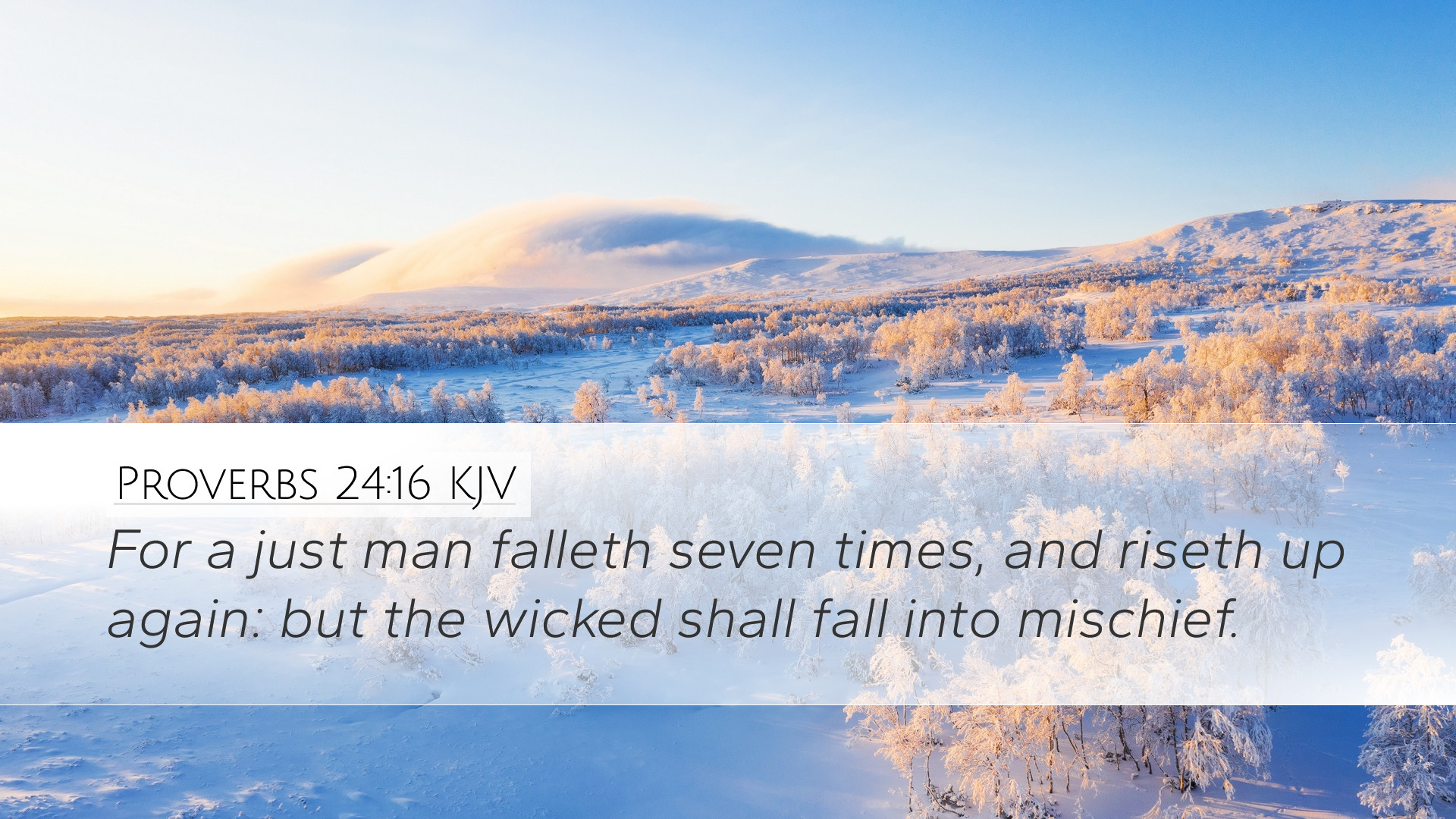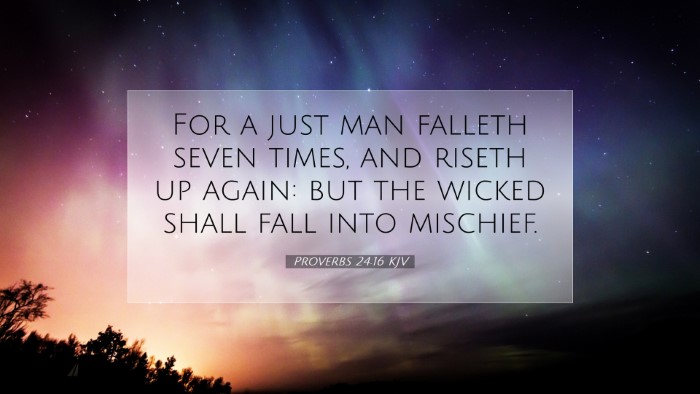Proverbs 24:16 Commentary
Verse: "For a just man falls seven times, and rises up again: but the wicked shall fall into mischief."
Proverbs 24:16 presents a profound insight into the nature of righteousness, resilience, and the ultimate distinction between the righteous and the wicked. Below, we offer a synthesis of insights drawn from various public domain commentaries, including those by Matthew Henry, Albert Barnes, and Adam Clarke.
Contextual Overview
The book of Proverbs is rich in wisdom literature that presents practical insights on living righteously. This verse serves as an encouragement to the righteous while also warning of the consequences of wickedness. The repetitive use of "seven times" signifies completeness, suggesting that even the most upright among us experience failure but have the capacity to rise again.
The Just Man
Characterization of the Just Man
Henry emphasizes the characteristic nature of the just man, who despite falling, maintains integrity and courage to rise again. This resilience reflects a deep commitment to God and His ways. Albert Barnes reinforces this with the notion that such a man is one who seeks after righteousness, understanding that life’s challenges are part of human experience. Furthermore, Adam Clarke notes that falling does not speak to a lack of righteousness, but rather to the trials inherent in the human condition.
- Resilience: The ability to rise after falling illustrates spiritual strength.
- Faithfulness: The just man continually seeks God’s help and restoration.
The Significance of "Seven Times"
Symbolism of the Number Seven
The number seven in scripture often symbolizes perfection and completeness. Henry highlights that the mention of "seven times" indicates that no matter the frequency of one’s failures, the righteous can expect divine assistance in recovery. Barnes points out that this steadfastness is a mark of true faith, where failure is met with hope and a renewed spirit to regain one's footing.
- Divine Grace: The just man receives grace to rise continuously.
- The Heart of Perseverance: It underlines the importance of perseverance in faith.
The Nature of Falling
It is essential to understand that falling does not equate to a loss of status in God’s eyes. Clarke discusses the idea that all believers may stumble; yet, their heart remains fixed upon the Lord. This is what differentiates them from the wicked. Barnes emphasizes that while transgression leads to moral failure, the righteous will seek restoration.
The Wicked and Their Fate
The Contrast with the Wicked
The latter half of the verse denotes a stark contrast to the just man’s perseverance. Henry notes that the wicked fall into mischief, indicating not just a single stumble but a continual pattern of sin that ensnares them. This “mischief” suggests a deeper entanglement in wrongdoing, reflecting a state of despair devoid of divine assistance.
- Ultimate Downfall: Unlike the just, the wicked remain in a state of despair with no hope of recovery.
- Need for Redemption: A call for repentance, as the wicked cannot save themselves.
Spiritual Lessons
From Proverbs 24:16, several key spiritual lessons emerge:
- Embrace Failure as a Teacher: Just as the just man falls, so too must believers see failure as an opportunity for growth and learning.
- Dependence on God: True strength lies in the reliance on God for restoration and support in times of trouble.
- Hope for the Fallen: There is always hope for those who have stumbled, provided they turn back to God with repentance.
- The Choice of Righteousness: Pursue righteousness diligently, as it leads to life, while wickedness leads to destruction.
Conclusion
In summary, Proverbs 24:16 encapsulates the journey of righteousness in the face of adversity. With insights from Henry, Barnes, and Clarke, we observe that falling is part of the human experience; yet the just man’s ability to rise reflects a deeper relationship with the divine. The verse challenges believers to consider their reactions when facing failure and encourages steadfastness in faith, exemplifying the resilience of the spirit enabled by God’s grace.


